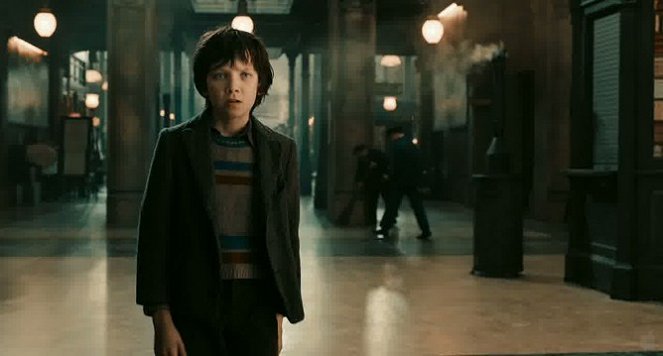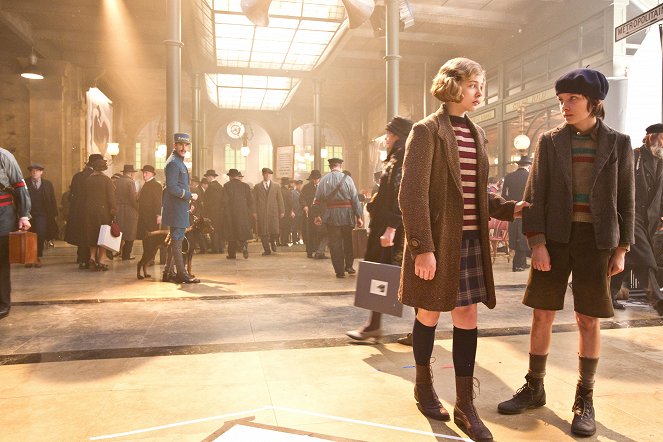Directed by:
Martin ScorseseScreenplay:
John LoganCinematography:
Robert RichardsonComposer:
Howard ShoreCast:
Ben Kingsley, Sacha Baron Cohen, Asa Butterfield, Chloë Grace Moretz, Ray Winstone, Emily Mortimer, Christopher Lee, Helen McCrory, Michael Stuhlbarg (more)VOD (2)
Plots(1)
Based on the award winning children's novel 'The Invention of Hugo Cabret'. Hugo is an orphan boy living in the walls of a train station in 1930s Paris. He learned to fix clocks and other gadgets from his father and uncle which he puts to use keeping the train station clocks running. The only thing that he has left that connects him to his dead father is an automaton (mechanical man) that doesn't work without a special key. Hugo needs to find the key to unlock the secret he believes it contains. On his adventures, he meets George Melies, a shopkeeper, who works in the train station, and his adventure-seeking god-daughter. Hugo finds that they have a surprising connection to his father and the automaton, and he discovers it unlocks some memories the old man has buried inside. (Paramount Pictures AU)
(more)Videos (16)
Reviews (13)
The original book has turned into an unoriginal film in which every added thing is just excessive. A lot of scenes seem to have been made just for the vaunted 3D (especially the completely unnecessary train accident), the story is strangely sloppy, too set-up, and Sacha Baron Cohen makes too big a fool of himself... Yes, the direction is skillful, the love for Hugo films is also very nice, but I certainly didn't see anything groundbreaking. Which is quite a shame. I don't tend to do that, but this time I really want to scream: Read the book, it's so much better!
()
Hugo is a beautifully crafted story that stands out in the world of cinema. Martin Scorsese not only shows his deep love for film, but he also weaves it into a narrative rooted in truth, with some imaginative elements added to create a captivating tale. The plot revolves around Hugo's hidden secret, which sets off a chain of events that unfolds into a touching and unique story. However, the pacing felt a bit slow, and I found myself wishing for more excitement to keep me fully engaged. Scorsese has pulled this off brilliantly in his other films, but this one didn’t quite bring that same level of thrill for me. Still, I thoroughly enjoyed the originality and the heart of the story, which makes Hugo a rare and unforgettable film experience.
()
More than just a tribute to the forefather of cinematic brats (weaned and further nourished on the sci-fi, fantasy and horror genres). The web of references to films and filmmakers who were influenced by Meliés and who possibly influenced Scorsese (who came to Meliés through his own spiritual father, Michael Powell) has multiple layers and one viewing is not nearly enough to disentangle them, while the revealing of the central idea, which is underpinned by numerous allusions, is no less entertaining. Film as a mechanical means of reviving memories, bringing people together and creating dreams. Here, only cinematic dreams, not real ones, which have the form of nightmares, serve as a reliable means of escape from reality (we therefore also mainly see examples from Meliés’s special-effects films and less from his reconstructed events). (In the second bad dream, there is a peculiar absence of clocks, i.e. time as a dimension, which mechanical inventions other than film lack). ___ The story isn’t divided into two parts; from the beginning, it’s about repairing a broken machine, with the first part accenting the mechanical level and the second part placing emphasis on the human level. We mainly see the machines first. They are placed in the foreground of the mis-en-scéne and, at the same time, Hugo pins all of his hopes on them. The first part also comes closer to grotesque films, as a human functions as an inanimate, mechanical object. The second part, from the activation of the automaton, is a partial negation of the modernistic enthusiasm over technological progress. Hugo starts to realise that the machines will not change anything about his loneliness. The guard’s mechanical leg, previously used as a source of gags, becomes a means of becoming close to the flower girl, who lost her brother at Verdun (mass slaughter thanks to the use of modern technology). The settings of the action are expanded with the addition of Meliés’s household and library. Books and people get more space. Technology is talked (theorised) about more than it is shown. ___ The mechanical thesis and the human antithesis logically lead to cinematic synthesis, to the joining of reason and emotion as, for example, Jean Epstein wrote about it (La Lyrosophie). The conclusion brings separate “peephole” scenes (gags) like those from early films into the overall narrative. Like the characters, these scenes find their place, their meaning. The film is constructed in such a way that it can result in a film. I cannot imagine a more wonderful tribute to the very idea of moving pictures. ___ The historical inaccuracies that Scorsese allows are easier to criticise than the outwardly atypical plot structure. Viewers’ dodging of the oncoming train can still be tolerated when reading the book by Tabard, who, as it happens, was not accurate in writing about Meliés, but not in Meliés’s own memoirs, which corrected other authorial errors. Meliés did not come across cinema by accident, as he was personally invited to a public film screening by the Lumière brothers and he did not create the camera from nothing, but improved an existing model by R.W. Paul. The decline in interest in his work did not come until the First World War. By about 1909, Meliés’s laborious method had made it simply impossible for him to shoot as quickly as the times demanded and he completed his final film in 1913. However, these details are overshadowed by his incredibly precise revival of old Paris and even older films (several seconds of Le Royaume des fées are memorable). The transfer into 3D gave these a new dimension without diminishing their charm. They are improved, though indirectly, by highlighting their meaning. Scorsese not only proclaims his love for film, but also calls on us not to forget. 90%
()
(less)
(more)
Martin and his big movie. Not his best, but undeniably his most personal. Here Scorsese (Hugo is him) professes his lifelong love of stories in the form of a melancholic kids’ movie which isn’t so much for kids, after all. And in addition to this he was the first to prove that 3D has its rightful place in cinema, where it can be something more than a mere good-looking bolt-on. Mainly and primarily this is a darn good movie; and that is all that is important in the end.
()
Some dreams do come true. The magic of film intertwined with reality, sketches with meticulously crafted images fly through the air, and Martin Scorsese pays homage to the beginnings of cinematography without getting overly sentimental or desperately trying to make the movie into a classic. Hugo seems like a sophisticated fairy tale about a boy and his great adventure, only to ultimately transform into a fascinating journey through human imagination and determination. And that nostalgic hurricane of memories of children's books and movies, as well as fascination with unreachable worlds, has a power that managed to captivate me completely.
()



Ads